Eucharist Pre-Constantine Era III
IV Ignatius of Antioch c. 35-107
Wrote 7 letters en route to martyrdom in ROME during reign of Trajan
Rome is undisputed center of Christianity, martyrdom of Peter & Paul. Alexandria, Antioch, and Constantinople were the other prominent communities.
Desire “bread of God, flesh of JC, seed of David and for drink His blood which is imperishable love”
- One Eucharist, one cup, one altar. Altar had a sacrificial meaning. (Philadelphians 4.1; also Ephesians 20.2).35 The repeated mention of an altar (θυσιαστήριον; Ephesians 5.2; Trallians 7.2; Magnesians 7.2) indicates a sacrificial understanding
- An event to be offered only in communion with the bishop and not a common meal. Note hierarchy already in place.
“Let that eucharist be considered valid that occurs under the bishop or the one to whom he entrusts it” (Smyrneans 8.1; also Ephesians 5.2-3; Trallians 7.2).”
Uncommon sacred meal, medicine brings immortality
Ignatius describes the Eucharist as “a medicine that brings immortality, an antidote that allows us not to die but to live at all times in Jesus Christ” (Ephesians 20); being “the flesh of our savior Jesus Christ, which suffered on behalf of our sins” (Smyrneans 7.1; cf. John 6:53-69).
Unites believers by their partaking (Smyrneans 8.1; Ephesians 20.2)
Earthy language of altar, moderns unbloody sacrifice, places of great beauty, profound beauty
Ignatius’ time understood bloody sacrifice. Understood cost. Different view of altar stone. Brethren turned to food in coliseum.
Far removed from act, and less thankful.
IV Didache (100) "The teaching of the Lord to the Gentiles (or Nations) by the twelve apostles".
, esp Chap 9, 10, 14 and 1 Cor connection, these 3 chapters may be older than document itself
- sacred ritual and meal
- benediction before bread and wine
- self-examination (confession of sins)
- need for baptism
- while it may be coupled to a meal, it is NOT open to all
- ecclesial unity
- thanksgiving to God through Jesus Christ
- Sacrificial character Chap 14
Naive concept not have formalized structure. Pagan world had rituals, Jewish religion highly ritualistic. Jesus & apostles had this education under Jewish patrimony. Foreign to Jewish or pagan mind to not have ritual.
-
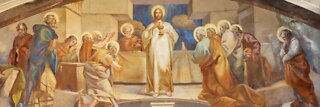 14:23
14:23
Fides et Ratio
2 years agoEucharist Pre-Constantine Era VII
30 -
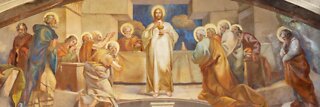 9:00
9:00
Fides et Ratio
2 years agoEucharist Pre-Constantine Era IV
16 -
 11:52
11:52
Jesus' Revelations thru Jakob Lorber English
1 year agoMarriage Blessing, Ceremonies, Bread and Wine... Jesus explains ❤️ The Great Gospel of John thru Jakob Lorber
139 -
 0:59
0:59
Oremus
1 year agoLet's talk about the Eucharist 🙌 #Eucharist #HolyCommunion #Transubstantiation #catholic #JMJ
421 -
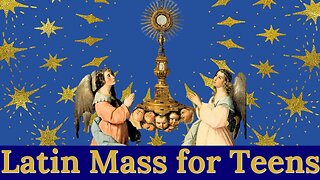 31:14
31:14
Catholic Conversations
8 months agoThe Eucharist: Real Presence - A Journey into Reverence
54 -
 1:33:18
1:33:18
HandinHandwithGodTv
10 months agoBible Study/Communion Service || September 27 2023
45 -
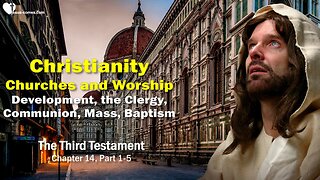 21:48
21:48
The Third Testament
1 year agoChristianity, Churches & Worship... Clergy, Communion, Mass & Baptism ❤️ 3rd Testament Chapter 14-1
88 -
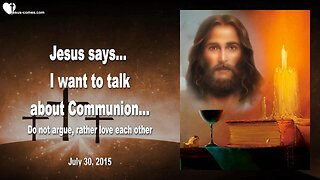 17:08
17:08
News from Jesus
1 year agoJuly 30, 2015 ❤️ Jesus says... I want to speak about Communion... Do not argue, love each other
114 -
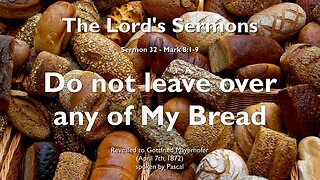 13:37
13:37
Jesus Christ reveals thru Gottfried Mayerhofer
1 year agoDo not leave over any of My Bread... Feeding of the four Thousand ❤️ Jesus elucidates Mark 8:1-9
98 -
 9:37
9:37
Brian Holdsworth
3 years agoDealing with Traditionalist Catholics
124